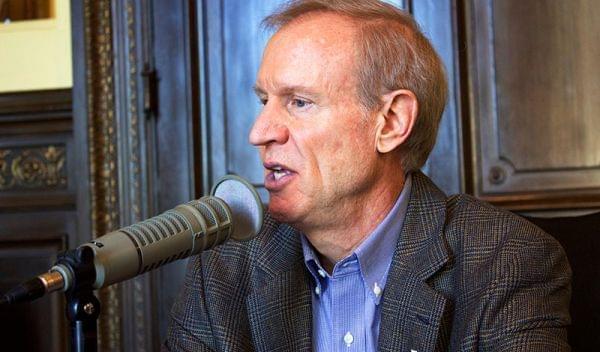Rauner Says Budget Cuts Aren’t Negotiating Tactic In Sit-Down Interview

Gov. Bruce Rauner sits for an interview with public radio on Tuesday in his Capitol office. Brian Mackey/WUIS
As Gov. Bruce Rauner marks his 100th day in office, the Republican sat down with Illinois Public Radio Statehouse Bureau Chief Amanda Vinicky to talk about his accomplishments and frustrations in his first few months as governor.
Rauner has faced wide criticism of recent budget cuts for statewide programs, including freezing grants for The Autism Program on World Autism Day.
"I feel terrible that we've had to have cuts," Rauner told Vinicky Tuesday. "Cuts hurt people. They're terrible. The reality, though, is we inherited a $1.6 billion budget hole from Pat Quinn...we just don't have the resources. We've got to live within our means."
Rauner is referring to the budget the General Assembly passed last May for Fiscal Year 2015 that assumed a Pat Quinn victory would mean the 2011 income tax hike would remain in tact, even past its scheduled Jan. 1 rollback. Instead, Rauner won the election, and the tax rate dropped from 5 percent to 3.75 for individuals, leaving an immediate budget shortfall.
Though Rauner was willing to talk about expanding a sales tax in Illinois during his campaign, since being elected, the governor has taken his "Turnaround Agenda" to every corner of the state, saying he'll be open to raising revenues once the state budget is trimmed and other business-friendly proposals are approved.
"We commited, along with all the members of the General Assembly, to try to fix the budget crisis without having to borrow or raise taxes right now," he said.
Rauner insists that recent cuts to programs like The Autism Program aren't a negotiating tool to induce the Democratically controlled General Assembly to approve his plans.
Lawmakers will spend the next five weeks crafting a budget for Fiscal Year 2016, and legislative leaders have indicated they may miss that traditional May 31 deadline, extending budget fights into the summer.
